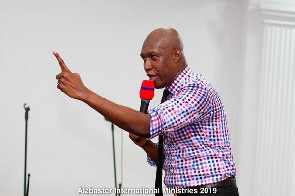On July 15th, the Accra high court ordered the Member of Parliament (MP) for Bawku Central, Mr. Adamu Dramani, to vacate his seat. The court’s order followed a suit filed by one Mr. Sumaila Biebel, who sought a declaration that the MP should be ordered to vacate his seat because the MP was a British national who did not qualify to be an MP.
It is important to state at the onset that the court did not establish whether the MP was a British national and whether it was, indeed, even the case that being a British national disqualified him from being an MP.
Rather, the court ruled that because the MP had failed to file his defence within 14 days, after entering his appearance, it deemed that that the MP did not have a defence to the suit. This is absurd and a complete travesty of justice!
The MP “failed to file a defense” because he was challenging the jurisdiction of the court to hear the case. Even though the high court had dismissed the MP’s motion challenging the court’s jurisdiction, the record was clear that the MP had filed an appeal against the court’s dismissal of the motion challenging its jurisdiction. Thus, it cannot be reasonably argued that he failed to file a defence.
That pending appeal alone should have been enough to prevent the judge from issuing the default judgment in a case, which seeks to set aside the wishes of the constituents of Bawku Central. But it gets worse because the plaintiff’s complaint did not establish on its face that there were sufficient grounds for granting him the prayers that he sought.
A “default judgment” is a binding judgment in favor of a plaintiff when the defendant has not responded to a summons or has failed to appear before a court of law. A defendant can have a default judgment vacated by filing a motion, after the judgment is entered, by the showing of a proper excuse. In practice an application to set aside a default Judgment is almost always granted. In most jurisdictions, default judgments are used sparingly since courts prefer to settle disputes on their merits. It is obvious from the definition above that a default judgment was completely unnecessary and inappropriate in the instant matter. Not only did the MP respond to the summons but he also appeared in court to challenge the jurisdiction of the court. Curiously, the judge also refused to set aside the default judgment even though most such judgments are routinely vacated, even in cases with much less significant claims. This raises significant questions about the judges’ temperament and ability to be fair in this matter. Jurisdiction is the authority granted to the courts to deal with and make pronouncements on legal matters and, by implication, to administer justice within a defined area of responsibility. It is the first question that must be asked and answered before a judge can sit on a particular case. Under article 140 (1), the High Court has jurisdiction in all matters and in particular, in civil and criminal matters and such original, appellate and other jurisdiction as may be conferred on it by this Constitution or any other law. Under article 130 (1), the Supreme Court shall have exclusive original jurisdiction in all matters relating to the enforcement or interpretation of this Constitution. Whether an elected MP, who is alleged to be a British national, is qualified to be an MP probably involves the enforcement and interpretation of article 94 (2) (a), which stipulates that “subject to the provisions of this article, a person shall not be qualified to be a member of Parliament if he owes allegiance to a country other than Ghana.” The high court judge may have felt that no enforcement or interpretation of the constitution was required by the dispute before him. But no properly trained judge will go as far as issuing a default judgment when the defendant has raised a prima facie reasonable challenge to its jurisdiction. Whatever article 94 (2) (a) means, it is beyond dispute that it is not addressed to dual citizens. The reasoning is very simple. At the time of promulgating the 1992 Constitution, dual citizenship was outlawed as follows: “… a citizen of Ghana Shall cease forthwith to be a citizen of Ghana if, on attaining the age of twenty-one years, he,… acquires or retains the citizenship of a country other than Ghana.” So when article 94 (2) (a) speaks about “allegiance to a country other than Ghana,” it could not have reasonably been addressed to dual citizens who had been “safely buried” by the Citizenship chapter of the Constitution. In my opinion, it was addressed to non-dual citizens who owed allegiance to other countries, either because they were in a foreign army, worked for a foreign intelligence unit, were spies, et cetera. I do believe that this article was informed by the swap of Ghanaian citizens between Ghana and the USA in the Soussodis matter. It was the Citizenship Act (2000) that first recognized dual citizenship in the 4th republic. Under Section 16 (1), “A citizen of Ghana may hold the citizenship of any other country in addition to his citizenship of Ghana.” Further, the Citizenship Act does not impose any disabilities on dual citizens with respect to becoming MPs. Nor, as I have already argued, can the “allegiance” language in article 94 (2) (a) be reasonably interpreted as applying to dual citizenship per se. That is, a dual citizen like a non-dual citizen can have allegiance to a country other than Ghana. Such allegiance is to be determined on a case by case basis and no group of Ghanaians should be considered as owing allegiance to other countries automatically. Even though it is beyond the scope of this article, I will be remiss not to discuss the original intent behind outlawing dual citizenship. It appears the ban was imposed because the then PNDC was in fear of the influence of the masses of people that it had forced to flee the country. Many of these émigré have started families in their new homes, acquired new citizenships, but have never forgotten their mother land. In fact, many of them were in the forefront in the efforts to restore democracy and continue to be engaged in the search for national progress. It will be a shame and extreme shortsightedness to exclude them from participating fully in our politics.
In conclusion, the high court judge rushed to issue the default judgment. There was no basis in law, certainly not in common sense, for such a default judgment. Even if we accept everything that the plaintiff has asserted in his claim as true, it still does not follow that the Bawku MP should vacate his seat. The palintiff has raised issues that border on constitutional interpretation and that are best resolved by the full panel of the Supreme Court. The decision of the high court should be vacated immediately to avoid any irreparable damage that it is likely to cause.
S. Kwaku Asare
New Achimota
Opinions of Monday, 27 July 2009
Columnist: Asare, S. Kwaku














